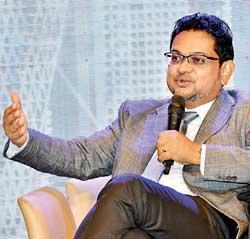Amid the growing concerns among bank deposit holders regarding the potential negative consequences during the progress of the Domestic Debt Optimisation (DDO) initiative, senior economist and Verité Research Executive Director Dr. Nishan de Mel said such fears appear to be unwarranted.
He asserted the need to put out the “unnecessary” fears regarding bank deposits being unsafe as a result of the DDO, as the last thing needed is the eruption of a panic attack that could result in depositors withdrawing their funds.
 |
| Dr. Nishan de Mel PIC BY WARUNA WANNIARACHCHI |
“If there is a panic run, that is when the banks fail. Not because they don’t have capital. Nobody can stop what will happen to banks with a panic attack. Depositors will want to withdraw their money immediately and that is very hard to manage. It is important that we don’t create a panic attack,” de Mel told an investor symposium organised by First Capital in Colombo.
He asserted that the bank deposits being unsafe is not a sensible concern to have, unless one is worried about hurting equity holders.
“Equity holders of banks are those who can invest in bonds and can take a little bit of a cut back. That is where the pain should go. Never of deposit holders,” assured Dr. de Mel.
Justifying his stance, Dr. de Mel noted that deposits were always safe and should always be safe, unless a government or a country very significantly mismanages the regulatory factors.
The reason is, with deposits, the contract is with the bank and in sovereign bonds or domestic or international sovereign bonds, the contract is with the government, he pointed out.
“… it is the bank owners who are in trouble, not the bank, simply because capital is easy to put back,” he said, pointing out that the local banks are well-capitalised.
Even if the banks are faced with less capital when the sovereign bonds are restructured, at best it creates a capital adequacy problem, added Dr. de Mel.



